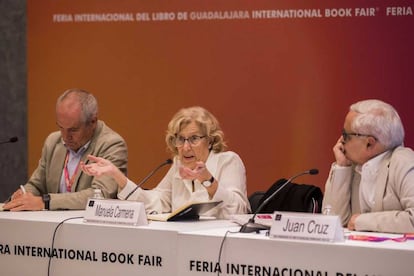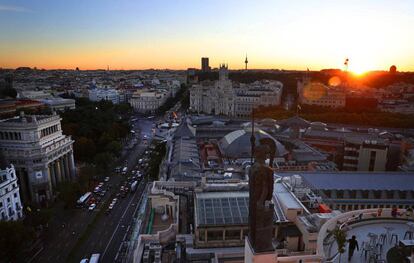Madrid takes center stage at Guadalajara book fair in Mexico
Mayor of Spanish capital and EL PAÍS editor-in-chief discuss darkness and light in the history of the metropolis


Some 44 years ago in Mexico City’s Bosque de Chapultepec (Chapultepec Forest) park, a statue was unveiled honoring Spanish poet León Felipe, who died in exile in Mexico. Now, four decades on, the poet has been honored again with an act of homage outside the Madrid pavilion at the huge Guadalajara International Book Fair – the most important gathering of publishers in the Spanish-speaking world.
There is no better transmitter of knowledge than reading EL PAÍS editor-in-chief Antonio Caño
It was a fitting tribute to the poet, a staunch opponent of Francisco Franco, who became the cultural attaché of the Spanish government in exile in Mexico during the dark years of the Spanish dictatorship. It was also another success for what has been a luminous week for Madrid, city of honor at this year’s event.
“The most important [thing about Madrid] is its people,” said current city mayor Manuela Carmena during a panel discussion about the Spanish capital on Sunday, at which she shared the stage with EL PAÍS editor-in-chief Antonio Caño.
Speaking at the event, Carmena drew a parallel between the current status of Spain’s largest city as a place of welcome and the Mexico that served as a refuge for the many Spaniards in exile during the Franco dictatorship. But she noted the weight of the past.
“During the [Franco] dictatorship, Madrid was, for many people, the regime, and this generated a very negative image, which changed with a process that continues to be viewed as exceptional: the Transition,” said the mayor, referring to the period in which Spain, in the years after the death of Franco, underwent a massive transformation from a dictatorship into the modern democracy it is now.

Carmena also cited the example of Madrid’s first post-dictatorship mayor, the writer and lawyer Enrique Tierno Galván, as a shining example of this new Madrid, and as one of her role models in terms of her position. “Madrid gained personality with the arrival of democracy,” she said.
“The dictatorship cast a long shadow over all of Spain but Madrid was a focus of ant-fascist resistance,” said Antonio Caño during the encounter with Carmena – one in which he also recalled his time as a correspondent in Mexico in the 1980s, saying: “It was very easy to be keep being a Madrileño en Mexico.”
This universal quality of the Spanish capital should lend it strength, Caño argued. “Madrid has a global dimension that it is already using but which it could make more of. Being global is about conceiving our surroundings as part of this universality,” he said, citing the example of the newspaper he edits.
Madrid gained personality with the arrival of democracy Madrid Mayor Manuela Carmena
“The city where the most paper copies of EL PAÍS are sold is Madrid but the city where we have the most readers, via our digital edition, is Mexico City,” he said.
During the talk, moderated by the Spanish journalist and writer Juan Cruz, there was time to celebrate literature as well. “A city that reads is a city is in a good position to judge the reality before it,” said Carmena.
“There is no better transmitter of knowledge than reading,” added Caño.
English version by George Mills.
Tu suscripción se está usando en otro dispositivo
¿Quieres añadir otro usuario a tu suscripción?
Si continúas leyendo en este dispositivo, no se podrá leer en el otro.
FlechaTu suscripción se está usando en otro dispositivo y solo puedes acceder a EL PAÍS desde un dispositivo a la vez.
Si quieres compartir tu cuenta, cambia tu suscripción a la modalidad Premium, así podrás añadir otro usuario. Cada uno accederá con su propia cuenta de email, lo que os permitirá personalizar vuestra experiencia en EL PAÍS.
¿Tienes una suscripción de empresa? Accede aquí para contratar más cuentas.
En el caso de no saber quién está usando tu cuenta, te recomendamos cambiar tu contraseña aquí.
Si decides continuar compartiendo tu cuenta, este mensaje se mostrará en tu dispositivo y en el de la otra persona que está usando tu cuenta de forma indefinida, afectando a tu experiencia de lectura. Puedes consultar aquí los términos y condiciones de la suscripción digital.








































